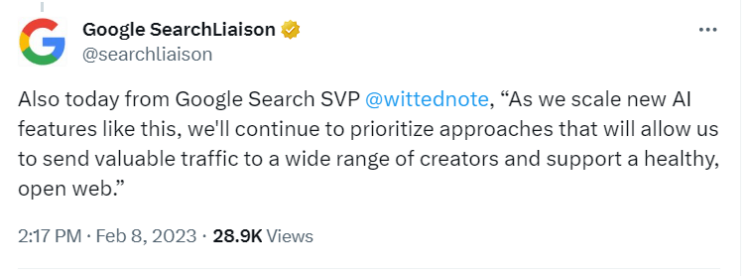
The search landscape is constantly evolving, and the introduction of generative search platforms such as Google’s Search Generative Experience are changing the way marketers optimize content for search engines. In this article, we’ll discuss the profound impact of artificial intelligence on search engines and uncover how AI is reshaping SEO through advanced keyword research, content strategies, SERP analysis, and more. The future of SEO is exciting, and marketers and content creators have the power to adapt and harness the power of AI in the rapidly evolving digital marketing realm.
Key Takeaways:
- Generative search platforms, such as Google’s Search Generative Experience, revolutionize organic search by using AI to provide conversational, contextually relevant answers directly within search results.
- Structured data plays a crucial role in AI’s ability to understand and navigate web content, significantly impacting search engine results and user experience.
- The introduction of Generative Engine Optimization (GEO) principles offer a novel approach to SEO, focusing on adapting and enhancing existing content for AI-driven search environments.
- As AI continues to evolve, embracing AI and generative AI tools in SEO and marketing practices is essential for staying competitive in the rapidly changing digital landscape.
- Generative search could transform SEO reporting, shifting the focus to more holistic, intent-driven metrics and on-page engagement signals, requiring a strategic pivot in SEO practices.
Optimizing SEO: The AI-Driven Approach
Using AI in search engines can improve SEO results by assisting with keyword research, SERP analysis, content writing, and optimization. SEO and content creators can leverage generative AI into their web content creation in several ways. Some specific tactics include:
- Keyword planning: Leverage AI-powered human language processing to discover and categorize keyword clusters.
- Content planning: AI can help with content planning by generating ideas for blog topics and developing outlines centered around specific concepts.
- Content writing: AI tools like ChatGPT can help create and execute content much faster than traditional methods.
- Content editing: AI can assist with editing content by performing tasks such as sentence correction.
- Content publishing and repurposing: AI can help publish and repurpose content.
SEOs are constantly finding ways to utilize AI tools to increase both efficiency and results, however, these ever-evolving tools are also changing the way people search and the way search engines provide answers. As we delve deeper into the AI transformation in SEO, we’ll explore how these evolving tools are not just optimizing current practices but are also shaping the future landscape of search engines, their algorithms, and user interactions.
Elevating Content Quality: AI’s Push For Authority
In the rapidly evolving realm of search engines and natural language processing (NLP), AI-powered tools like Bing Chat, ChatGPT, Google’s Bard, and the Search Generative Experience (SGE) are setting new standards for information retrieval and content value. These platforms highlight the increasing importance of high-quality, authoritative and deeply researched content when producing relevant results for users.
BingChat/Copilot:
Developed by Microsoft and based on OpenAI’s machine learning large language model, BingChat, now known as Microsoft Copilot, integrates web search results into its conversational responses, steering users towards authoritative sources. A key feature of Copilot is that it can search the web and incorporate the results into its answers. According to Microsoft exec Mikhail Parakhin, switching the modes in Copilot changes fundamental aspects of the bot’s behavior, including swapping between different AI models that have received additional training from human responses to its output.
It uses advanced machine deep learning techniques to create a search engine that continuously learns from its users and their content. BingChat gathers its responses from the web and provides links to sources for each answer. The links for references in the answers and results are annotated (numbered links). If you tap on the bot’s reply, the text becomes underlined to indicate they are clickable. This drives more domain-aware and intelligent search.
While Copilot is not directly integrated within Bing’s traditional SERP (Search Engine Results Page), the user can switch to Copilot’s conversational results with a click of a button, as seen below.
“With the Copilot experience, you can also ask follow-up questions such as, “can you explain that in simpler terms,” or, “give me more options” to get different and even more detailed answers in your search. However, in Copilot, each conversation will have a limited number of interactions, to keep the interactions grounded in search.”
Microsoft aims to change the way people search: “Search in a way that feels natural to how you talk, text, and think. Copilot takes your complex searches and shares back a detailed response…beyond generating a list of relevant links, Copilot consolidates reliable sources across the web to give you a single, summarized answer.”
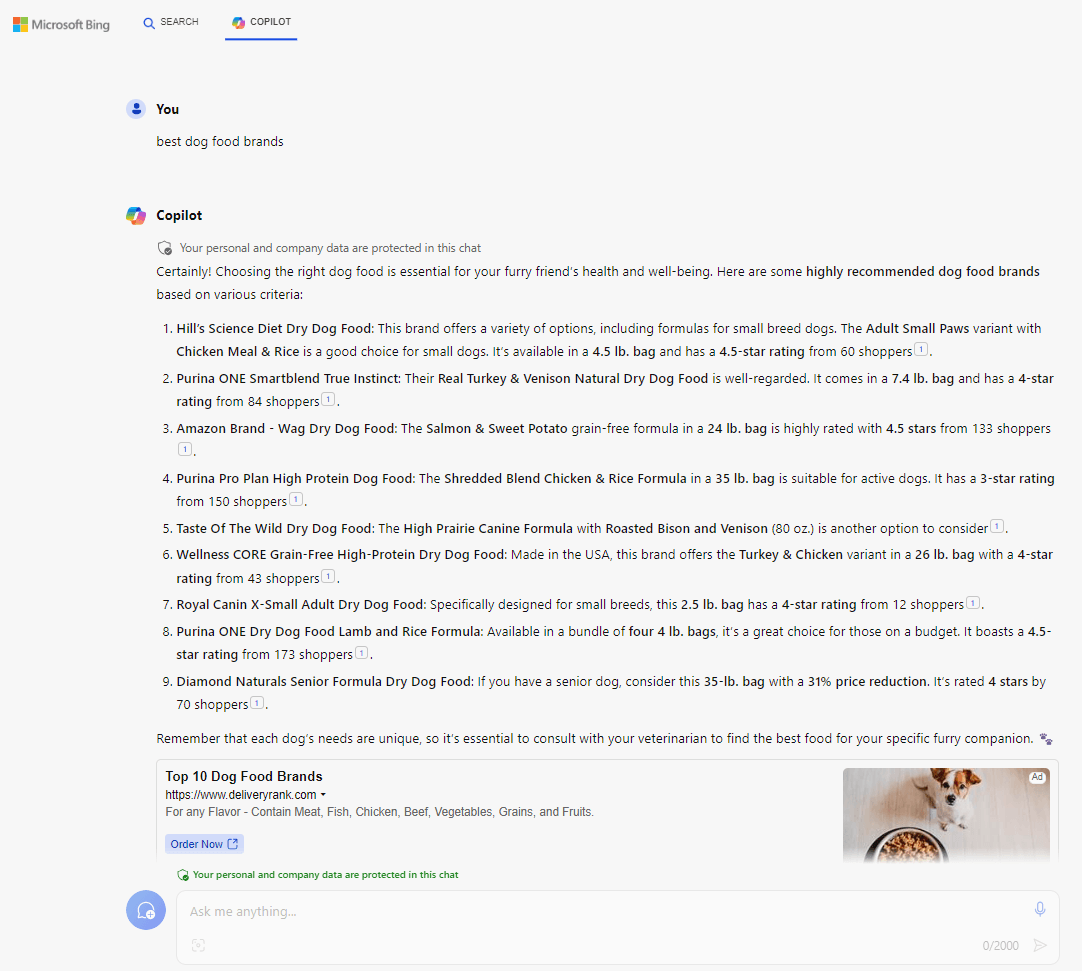
Microsoft’s Bing Chat/Copilot
Google’s Bard and SGE:
Google’s Bard and the Search Generative Experience (SGE) represent significant advancements in search engine technology. While Bard, an LLM chat platform similar to ChatGPT and BingChat, excels in creative collaboration and human-like conversations, drawing on Google’s advanced large language model, SGE enhances Google’s traditional search functionalities. Essentially, Bard operates in a similar capacity to BingChat. At the same time, the introduction of SGE provides AI-powered snapshots of key information alongside search results, offering more conversational and contextually relevant answers directly on the SERP.
“With new generative AI capabilities in Search, we’re now taking more of the work out of searching, so you’ll be able to understand a topic faster, uncover new viewpoints and insights, and get things done more easily.”
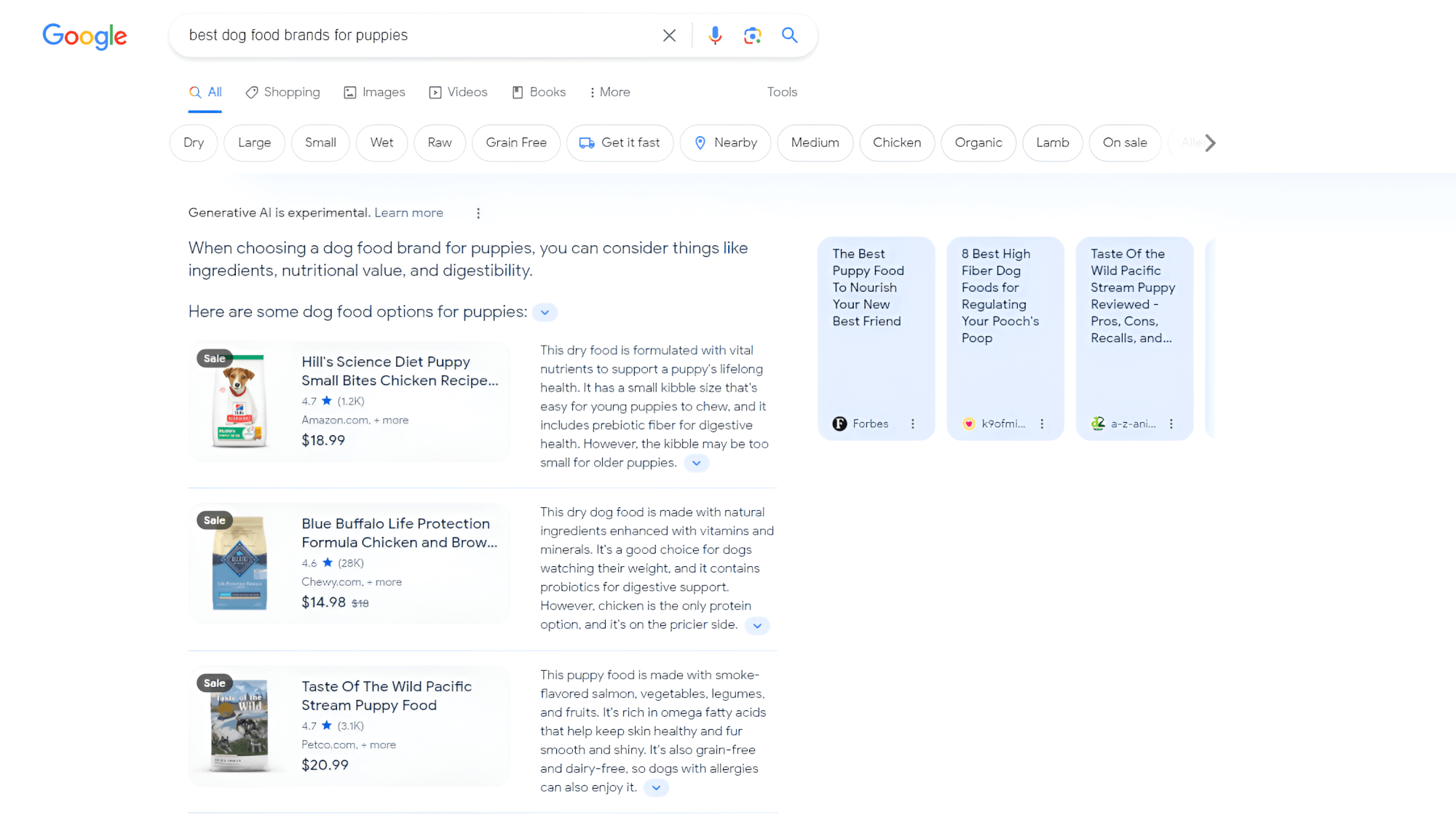
Google’s Search Generative Experience (SGE)
Additionally, this integration means users can enjoy a blend of generative AI-driven conversational responses and traditional search outputs, making Google a powerful tool for both quick user queries and in-depth research. SGE allows users to ask their AI platform follow-up questions and conversational queries directly from their original search, with no need to open Bard directly.

Google’s Search Generative Experience (SGE)
“When you tap on these, it takes you to a new conversational mode, where you can ask Google more about the topic you’re exploring. Context will be carried over from question to question, to help you more naturally continue your exploration. You’ll also find helpful jumping-off points to web content and a range of perspectives that you can dig into.”
For SEO, this implies that it will be necessary to create content that ranks well in traditional search engines and is considered valuable enough by the algorithms to be referenced by AI chat platforms like Bard and SGE. Content must be thoroughly researched, comprehensive, and provide extensive coverage of topics to meet the criteria of these advanced generative AI systems. The focus should be on content that answers users’ immediate questions and provides additional context and information, making it a go-to resource for both AI systems and users.
AI Tools Within Search Are Constantly Improving and Evolving
It is important to note that all these tools change daily, sometimes dramatically. SGE is still in beta, and users must opt-in to try out the Search Generative Experience. However, it is safe to assume these tools are here to stay and will be rolled out to wider audiences in the future. The rise of AI chat platforms like Bing Chat, ChatGPT-4, Google’s Bard, and SGE signals a shift towards more nuanced and sophisticated search interactions. SEO strategies must evolve to focus on deep, authoritative content that caters to both the AI’s and users’ needs for accurate and comprehensive information. This approach is crucial for staying relevant and visible in the AI-augmented SEO landscape.
GEO: Generative Engine Optimization: Optimizing for the Future of Search
AI-powered search engines significantly affect both search engine optimization and the overall search experience. AI technologies focus on contextual relevance, intent-based ranking, personalization, authority, cross-language, and more. SEO best practices already reward these methods, and marketers will continue to find success focusing on these strategies to optimize websites, for example:
Emphasis on Contextual Relevance: SEO professionals must focus on providing contextually relevant content to the user’s search query to rank higher in generative search results.
Optimization for Intent-based Ranking: SEO professionals must optimize their websites to align with user intent to rank higher in intent-based search results.
Importance of Intent Based Personalization: Personalization is an essential aspect of generative search, and SEO professionals must understand how to leverage personalization to optimize their websites for search.
Consideration of Cross-Language Search: SEO professionals must optimize their websites for cross-language searches to reach a broader audience.
Voice Search Optimization: With the increasing popularity of voice search, SEO professionals must optimize their websites for voice search to stay ahead of the curve.
However, as generative search continues to become more prominent, the way SEOs optimize for search will continue to change. A study from Princeton recently investigated what they are calling Generative Engine Optimization or GEO. This in-depth study evaluates GEO via seven key elements, termed Generative Optimization Methods.
Generative Optimization Methods
- Authoritative: This involves modifying the text style to be more persuasive and authoritative, enhancing the perceived credibility of the content.
- Keyword Optimization: Adds more keywords and semantically related keywords directly from the query where they fit and flow naturally within the webpage’s content.
- Statistics Addition: Replaces qualitative discussion with quantitative statistics, adding authority and trust.
- Cite Sources & Quotation Addition: Adds relevant citations and quotations from credible sources, again adding authority and trust.
- Easy-to-Understand: Simplifies the language of the website and makes the intent of the page easy to understand for both the user and search engines.
- Fluency Optimization: Improves the fluency of website text. Not only is the content easy to understand, but the content is also easily skimmed and digestible.
- Unique Words & Technical Terms: Adds unique and technical terms respectively, making your content stand out from the competition.

Google’s SGE (Mobile)
The Princeton study outlines that most Generative Engine Optimization (GEO) methods, except for three, do not require adding new content. Instead, they focus on enhancing how existing content is presented to increase its effectiveness and appeal to AI-driven search engines. These methods are broadly categorized into Content Addition and Stylistic Optimization.
In short, the study highlights that creating new content isn’t always necessary. Instead, marketers can focus on adapting and enhancing existing content. This approach allows website owners to make their existing content more persuasive and appealing to generative search engines. This means that by following the GEO principles, marketers can effectively optimize their content for AI-driven search environments without the need to generate entirely new material. In practical application, website owners will implement these GEO strategies by modifying their text following these principles to optimize their content for better performance in AI-generated search responses.
The Importance of Structured Data
Structured data, entities, and formats, such as JSON-LD or Microdata, are essential elements for creating a website that is easy to understand and navigate for humans and AI while also producing relevant results for search engines.
Structured data organizes and labels information on a web page using standardized schemas and vocabularies. Entities are the concepts or things represented by structured data, such as products, events, people, or places. AI and search engine algorithms extract relevant information from the web page and provide rich and accurate results to users’ queries.
For example, AI can analyze a web page with structured data and entities for recipes; AI can use them to infer the ingredients, steps, nutrition facts, and other aspects of the dish, in a more human-like and interactive experience.
These elements will influence how AI interprets website content in several ways.
- Structured data helps AI understand the context and meaning of the web page and its content.
- It helps AI generate natural language summaries or descriptions of the web page and its content.
Website structured data, entities, and formats will influence AI interpreting website content by making it easier for AI to access, analyze, and communicate the information on the web page. This will benefit both website owners and the user experience by improving the quality and indexing of search engine results.
Implications of AI Chat-Powered Responses Keyword Ranking and SEO Reporting
The advent of AI chat search engines could impact traditional SEO keyword ranking and reporting significantly in the future. These AI systems can provide direct answers and generate content in real-time and could shift the focus from traditional keyword-based search results to a more holistic, intent-driven approach. This change may demand a strategic pivot in SEO practices, where understanding the context and user intent becomes paramount. SEO experts must now consider how AI-generated responses influence keyword relevance and ranking, adapting their strategies to stay effective in this new search landscape. For example, organic traffic reporting may shift to focus more on on-page and conversion signals rather than focusing on organic ranking positions. While users may receive answers to their queries within the chat platform, they must still visit external sites for purchases.
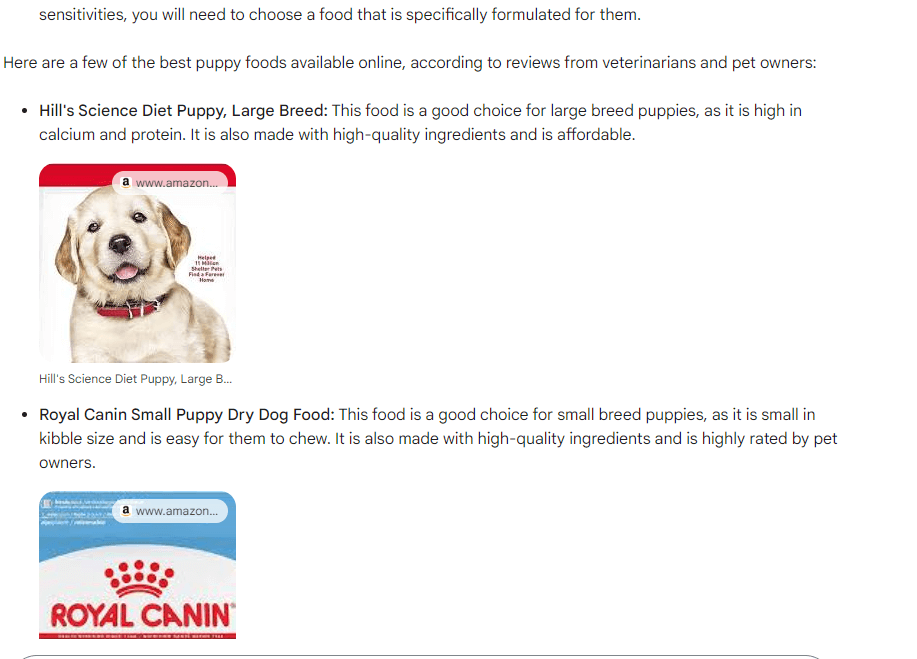
Google’s Bard Chat
As these technologies become more prevalent, we could see a shift in how we measure the impact of SEO in the future. While keyword ranking reporting is not going anywhere soon, a heavier reliance on on-page signals will be needed for accurate reporting on organic search.
For top of funnel and informational content, such as blog content, AI chat platforms currently do not do a wonderful job of linking out to external web pages and citing their sources, but this has already improved over time, and Google has pledged to address this issue, showing their commitment to sending traffic to external websites:
While Chat GPT still does not provide citations and external links, Bing and Bard do in fact include these citation features within their chat platforms:
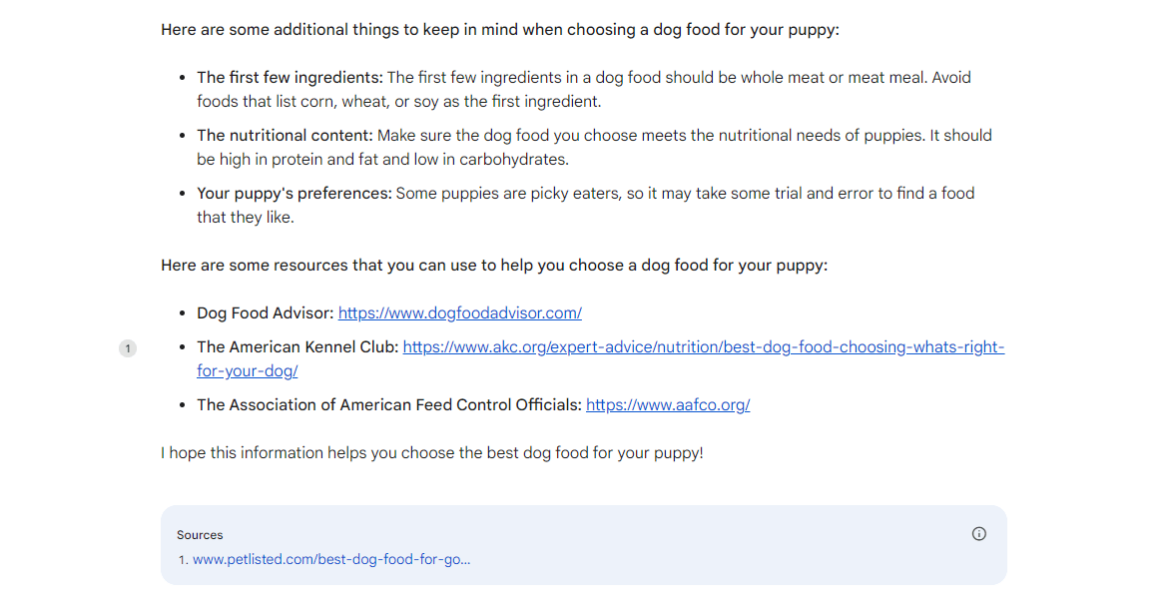
Google’s Bard Chat
AI Chat platforms will most assuredly change the way we report on keyword rankings and organic traffic in the future, but there is no reason to panic. While these platforms continue to improve every day, they are still full of issues, such as Chat GPT’s tendency to fabricate answers in its responses.
In addition, there has been no indication from Google or Bing that they plan to use these platforms to replace traditional organic search, for the time being, they seem to only want to complement their existing platforms.
“In reality, Google Search sends billions of clicks to websites every day, and we’ve sent more traffic to the open web every year since Google was first created.” –Danny Sullivan (Google Search Liaison)
Search engines like Google rely on the creation of webpages to inform these chat bots, if they do not reward websites for creating content, they will lose the brain power behind these ai algorithms and chat platforms. The goal for marketers will be to create sufficient and high-quality content that Google and other search platforms will view as valuable enough to include in their chat responses, as Google directly points out on their SGE page:
“We know that people want to hear insights from others to help inform their decisions, so we’ve designed these new experiences to highlight and drive attention to content on the web, making it easy for people to dive deeper on the topic they’re learning about. As we bring generative AI into Search, we’re committed to continue sending valuable traffic to sites across the web.” -Google
Implications of AI Chat-Powered Responses on Search Demand Reporting
The increasing use of AI chat tools like ChatGPT, Bard, and Bing Chat could lead to a notable decrease in traditional search volume metrics on platforms like Google. As users turn to these AI chatbots for instant, conversational answers, the reliance on conventional search engines may diminish in the future, impacting how search interest is measured and analyzed. This shift could necessitate a reevaluation of how SEOs measure and report on search interest and demand, with a focus on understanding and integrating AI-driven search behaviors.
Currently, digital marketers and SEOs rely heavily on Google Trends, Google Search Console, and keyword research tools to inform them on how much demand/interest a certain keyword may have. The trend toward AI chat tools could represent a fundamental change in the way information is sought and consumed, potentially reshaping the landscape of how digital search demand and SEO metrics are measured.
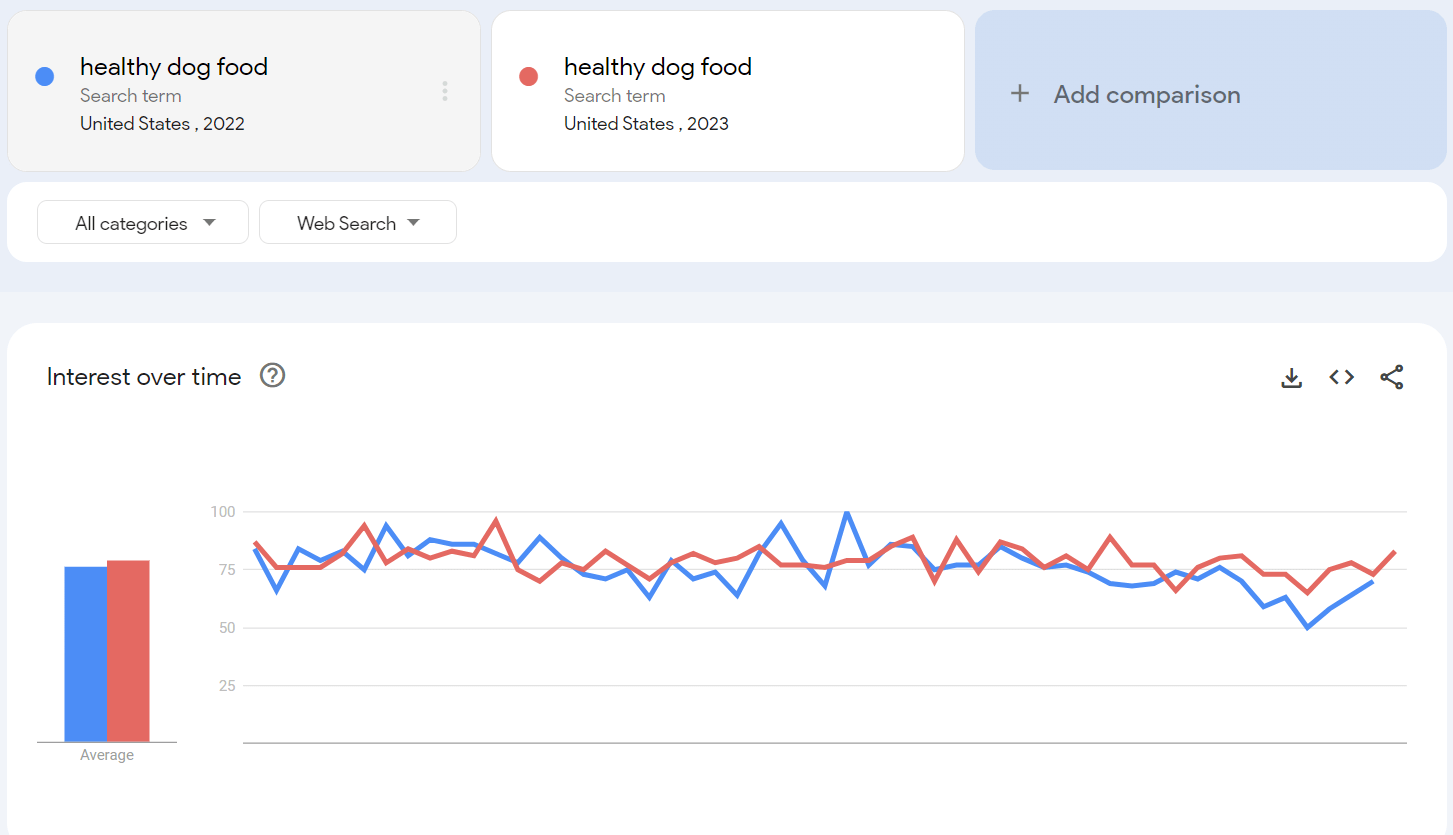
Google Trends
As of now, however, this does not appear to be happening. In Q3 of 2023, Alphabet Inc., Google’s parent company, reported an 11% increase in search revenue compared to 2022. While we do not have the exact search demand numbers from Google, this metric could suggest that overall search demand is actually increasing, at least for the time being. However, AI search tools are constantly evolving and changing the way search works.
In the future, we could see companies like Microsoft and Google release information informing us on trends and volume for certain keywords and topics within their AI chat features. But for now, the traditional methods offer the best insight. It can be assumed that there is a correlation between search volumes on traditional search and within AI chat platforms. So, while we await any future developments, marketers can continue to use the traditional search interest measurements as a baseline to inform us how people are searching, whether that be through AI chat platforms or conventional search engines such as Google.
Adapting Marketing Strategies For the AI-Era and Search Generative Experience (SGE)
As AI continues to transform search engines, marketers are encountering new challenges and opportunities. A significant shift noted by experts are declines in organic site traffic, possibly in part attributed to changes in search engine design and user behavior. Nicole Greene, an analyst at Gartner, highlights this trend in an article from Digiday. She points out that “organic site traffic declined 9% between the fourth quarter of 2022 and the third quarter of 2023. To address this, marketers need to focus more on where customers are, increasingly in genAI enabled search platforms.”
This transition to AI-driven platforms demands a strategic pivot for marketers. “CMOs also need to rethink how they measure success,” Greene advises. “A straightforward approach is to focus on creating copy aligned to customer insights and keywords. Using these embedded capabilities has the potential to help marketers recover traffic and brand visibility lost due to changes in search engine design.” Due to the ever-changing landscape of “traditional” Google search, such as last year’s Helpful Content Update, we should not attribute all, if any, of Garter’s traffic loss to AI generative experiences. We know that SGE is currently only available in beta, meaning users still have to opt in to experiment with the platform. The trial version of SGE was slated to originally conclude in December of 2023, but that has now been extended indefinitely, and we do not yet know when SGE will launch to the general public. However, this approach and data from Garter could be a sign of how we may interpret traffic signals in the future when considering the impact of SGE and the future of organic search in general.
Furthermore, the rise of generative AI tools offers a unique opportunity for marketers to streamline their content creation, including the use of Google’s Gemini directly in the ad creation process. As pointed out by Greene, “A lot of brands are looking for this one place where they can create something and then push to multiple endpoints. That’s where we already really resonate with customers. And anything Google does is kind of great for us because it reinforces that the path is right…We benefit because we also use their models, but ultimately, from a customer perspective, we can add a ton of value doing omni-channel campaigns versus a single channel.”
We know that advertisements on organic search are a vital element in how Google generates revenue, and Google has no intention of eliminating that market:
“We also believe that ads are a vital piece of how the web works, and help people find relevant products and services. In this new generative experience, Search ads will continue to appear in dedicated ad slots throughout the page. And we’ll continue to uphold our commitment to ads transparency and making sure ads are distinguishable from organic search results.” -Google
This emphasizes that while the nature of organic search may evolve, it remains a vital part of SEO and the consumer journey. Furthermore, this shift highlights how marketers can significantly benefit from AI tools, which allow for expanding reach and enhancing campaign effectiveness. Embracing AI and generative AI tools enables marketers to adapt to changing landscapes, aligning their strategies with the evolving dynamics of search engines and consumer behavior.
Embracing the Future of AI in SEO and Marketing
In summary, the integration of AI technologies into SEO and marketing workflows marks a significant advancement in the digital marketing landscape and how search works. From enhancing keyword research and content creation to voice search and structured data interpretation, AI is reshaping the way we approach search engine optimization. The capabilities of tools like Bing Chat, ChatGPT, and Google’s Bard and SGE highlight the shift towards more sophisticated, intent-driven search strategies and the importance of producing deep, authoritative content.

Google Search Labs
Moreover, the expansion of AI’s role into broader marketing workflows emphasizes its transformative impact. AI’s ability to personalize customer experiences, predict behaviors, and automate various marketing tasks presents unprecedented opportunities for efficiency and effectiveness in marketing strategies.
As the digital world continues to evolve, it’s clear that AI will play an increasingly central role in shaping the future of SEO and marketing. Embracing these technologies not only enhances current practices but also prepares businesses for the emerging trends and demands of tomorrow’s digital marketplace. By staying informed and adaptable, marketers and SEO professionals can leverage AI to drive success and maintain a competitive edge in an ever-changing digital environment.
Contact Overdrive Search Experts to learn how we can help you stay on-trend with generative search.



